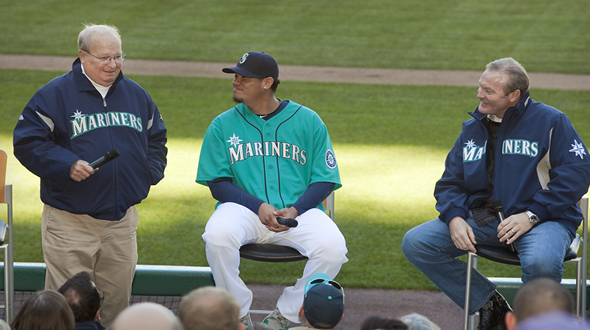
My oh hell.
The Mariners lost their icon. Seattle lost its voice. Our one good season, summer, took a kick to the soul.
Don’t talk to me about Dave Niehaus’s late-career slips and miscalls. Any longtime fan of local baseball knew what was up.
He didn’t want to let go. We didn’t want him to let go. We didn’t want to let him go.
So we accepted the fade of an old man because of the sentimental body of his work, his attachment to his craft and the implausibility of his replacement.
Plus, he described so much bad baseball in his broadcasting career that many fans wanted the Mariners to make the World Series more for him than themselves.
Hard to believe that most epic wound to a scabrous season rich only in controversy would come after it supposedly couldn’t have become worse.
It’s a damn shame that the Mariners never lived up to their play-by-play man.
For a good baseball radio guy, there is an endearment borne of many things: Dailyness, familiarity that borders on intimacy, summer, storytelling, the pleasure of animating his descriptions in our imaginations. When these idylls of the American life are wrapped in the whiskeyed baritone of a bright, genial gentleman whose 35-year joy for his job was unquestioned, well, it’s impossible not to like him, and like what he likes.
That’s what the Mariners will find to be irreplaceable. Sure, they paid him well, but if Dave Niehaus liked the Mariners, there must be something good about this ballclub.
Ten years ago, during a vacation at Lake Chelan, I sat with friends on the deck of a cabin, feet up, beers out, the Mariners-Red Sox game on the radio in the background. Coming from a station in Colfax, the signal was scratchy — a country-music station crowding in on one side, a Christian preacher on the other side (how Eastern Washington can you get?).
The lake was calm, the night was warm, the stars were out and the game was tied at 3. As the extra innings piled up, the assembled friends starting peeling away to their cabins. But the experience of listening to a game through static in the dark grew more compelling for me.
A part of it was the curiosity of listening to Niehaus’ voice weave in and around Waylon Jennings and the preacher. Another part was listening to the game narrative rise and fall with each passing inning as he exulted about scoring opportunities, lamented their passing, marveled at feats and agonized at misplays.
By the time Mike Cameron struck the decisive blow, a home run, to give the Mariners a 5-4 win, 19 innings and a day had passed. As the radio lay on my pillow at 1:30 in the morning while the familiar voice rang out in jubilation, I realized that it had been since childhood that I really listened to a ballgame in the same way.
Years of professional need for information and the urgency of newspaper deadlines had made most radiocasts a mere work tool. But for most of six and a half hours that night on vacation, I sat in thrall, listening to a friend, colleague and consummate pro tell me a spellbinding story whose outcome had me wide awake.
Its length and outcome made the game dramatic. The storytelling by Niehaus made it memorable.
That is why Niehaus was so treasured, and why mourning is so deep today in Sea-town and around the Sound. For all their misdeeds, the Mariners have brought many moments of sports exhilaration and inspiration, and Niehaus was there to describe well nearly every one of them.
Even if we bore eyewitness at the Kingdome or Safeco Field to something majestic from Ken Griffey Jr., Edgar Martinez, Randy Johnson or Ichiro Suzuki, we had to hear Niehaus describe it on TV or radio to authenticate our experience. What did Dave see, and how did he say it?
He was the franchise’s authority figure. One chilly afternoon this spring, before every last bolt, nut, washer and hinge had come off the Mariners bandwagon, Niehaus was on the field at Safeco engaging in his pre-game ritual of walking up to people and beginning a conversation with, “Did you hear the one about …”
He was dressed in a full-length coat — almost mobster-ish, at least in the eyes of Griffey. As Niehaus turned from the gaggle of people laughing at the joke’s punch line and headed down the dugout steps, Griffey turned to me and pointed at the man he had come to know and love over more than 20 years.
“Godfather,” he said, snickering.
I didn’t think much about the remark until now, upon Niehaus’s death. But as has often been the case with Griffey, he is wise in the ways of people (would that he had the same insights about himself, but that’s another story). Griffey knew that Niehaus was much more than a broadcaster. Not as a figure of malevolence, but of benevolence.
Through all the ownerships, through all the managers, general managers and players, through all the controversies, excitement and despair, Niehaus stood astride the franchise, the man from whom all sought a secular blessing. At the franchise’s crowning achievement, the debut of Safeco Field in July 1999, he threw out the ceremonial first pitch because the fans would have stood for no alternative.
Maybe that speaks a little to the baseball pathos of the enterprise, too, but when it came to the major leagues in Seattle, Dave Niehaus was the man.
Absolutely, unequivocally and fortunately for all of us, the Mariners got one right.

1 Comment
as Stanley Holmes father in law I am happy to see all of your hard work come to a successful start.